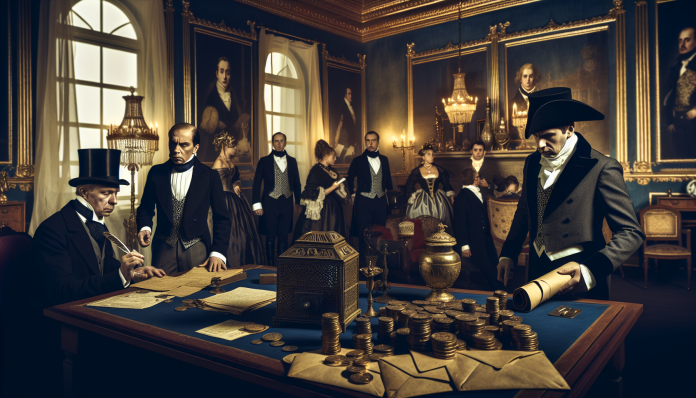Introduction
In the annals of history, few figures loom as large as Napoleon Bonaparte, the brilliant yet controversial leader of France whose quest for power reshaped Europe. However, even the mightiest can be ensnared in personal drama. One such entanglement—the tumultuous love triangle involving Napoleon, his first wife Joséphine de Beauharnais, and his ambitious mistress, Pauline Fourès—nearly jeopardized his legacy during the early 19th century. At a time when societal norms heavily dictated personal relationships, the scandal not only captivated the public’s imagination but also revealed the complexities of love, power, and betrayal in a world where personal and political lines often blurred.
The Scandal
A Marriage of Convenience
Napoleon’s marriage to Joséphine was not initially based on romantic love. Instead, it was a strategic alliance that brought political legitimacy and social standing to a rising military leader. Joséphine, a widow with two children, had found her new partner in the ambitious young general who was rapidly climbing the ranks of French society. Their marriage in 1796 signified a blending of personal ambitions and societal expectations, as Napoleon sought a stable family life to bolster his public image.
However, even from the beginning, Joséphine’s incapacity to provide Napoleon with an heir placed immense strain on their relationship. By 1805, the cracks began to show as the Emperor’s eyes wandered, leading him to the allure of various ladies among his court—and most significantly, to Pauline Fourès.
Enter Pauline Fourès
Pauline, a young beauty whose charm and vivacity caught the energetic Bonaparte’s attention, entered his life during the Egyptian campaign of 1798. Married to General Jean-Antoine Fourès, she quickly became a coveted figure, thanks to her association with the powerful commander. The scandal erupted when Napoleon engaged in an affair with Pauline that gained public notoriety in the years that followed.
Notably, one of the most dashing moments of this affair occurred when Napoleon’s flirtations intensified while they were both stationed in Egypt. Historical accounts depict a passionate romance, filled with secret encounters and stolen kisses, that also sparked outrage among the ranks and in Parisian society. Critics accused Napoleon of neglecting his duties to indulge in romantic escapades, ultimately jeopardizing his ambition and goals.
Public Reaction and Impact
The love affair was made even more scandalous by Joséphine’s presence, for while the couple was already experiencing a tumultuous marriage, the very public nature of Napoleon’s infidelity amplified sentiments against him. The affair ignited conversations in salons and coffee shops—a microcosm of the wider societal discourse.
Napoleon’s plight was partially ameliorated by the era’s attitudes toward masculinity, monarchical power, and love. Despite being publicly derided, the expectation that men would sow their wild oats was prevalent, reducing the scandal’s overall impact on Napoleon’s career. However, Joséphine’s lingering influence and the expectation of loyalty from women created a perfect storm of intrigue and tension.
Moral and Cultural Analysis
Society at the Time
Early 19th-century France was a society steeped in rigid moral expectations, particularly concerning gender roles. The ideal woman was expected to be a dutiful wife, modest and reserved, while men were granted greater liberty in behavior. At the same time, the French Revolution had spurred radical changes in societal norms, which began to challenge traditional hierarchies.
As details of the love triangle swirled, societal reactions reflected this complexity. Brittany’s bourgeoisie decried Napoleon, branding him unfit for power, while others admired his fervor for passion and autonomy. Letters exchanged between nobles and critiques by influent writers of the time portrayed a tantalizingly magnetic portrait of scandal—a mix of reverence and reproach.
Consequences for Those Involved
Ultimately, the affair with Pauline Fourès failed to displace Joséphine entirely from Napoleon’s life. However, the emotional toll would consequently pit the two women against one another—culminating in political expedience. Napoleon eventually used the tension to justify his divorce from Joséphine in 1810. This decision paved the way for his marriage to Marie Louise of Austria—a political union that produced an heir, fulfilling his desire for dynasty amidst the turbulent backdrop of war and conquest.
While Joséphine accepted her fate with dignity, Pauline Fourès faced societal judgment as her marriage deteriorated. Their scandal, though damaging, also highlighted the fluidity of political power and personal ambition—a notion congruent with contemporary dynamics in modern societies.
A Modern Perspective
Fast forward to the 21st century, and the dimensions of the scandal shift dramatically. Today’s liberal values promote individual agency, casting a more benign light on personal relationships; an affair between powerful figures no longer raises eyebrows as it did in the early 1800s. Instead, it would likely be interpreted through a lens of personal growth and choice, reflecting tolerance for complexity within human relationships.
Modern audiences might see the scandal as a nuanced narrative of agency, emotional intelligence, and the intersection of public and private lives. In a world where fidelity and romance dynamics have evolved, Napoleon’s character may resonate differently, often eliciting confusion and empathy rather than condemnation.
Conclusion
The love triangle between Napoleon, Joséphine, and Pauline stands as an archetypal narrative in history—an intricate portrait of ambition, desire, and the potential consequences of intertwining personal relationships with political destinies. This scandal foreshadowed shifting attitudes toward love, sex, and the intrinsic human desire for power and freedom.
While contemporary society often champions individualism and celebrates a more liberated perspective on relationships, Napoleon’s scandal invites readers to reflect critically on how societal norms shape actions and reputations. As history continues to ripple through the present, this tale of passion and power reminds us of the enduring complexities that define the human experience.
Ultimately, the story encourages modern audiences to recognize that while values may evolve, the fundamental tug-of-war between love, power, and societal norms has persisted—an insightful reminder that the chronicles of history are, in many ways, the chronicles of humanity itself.

